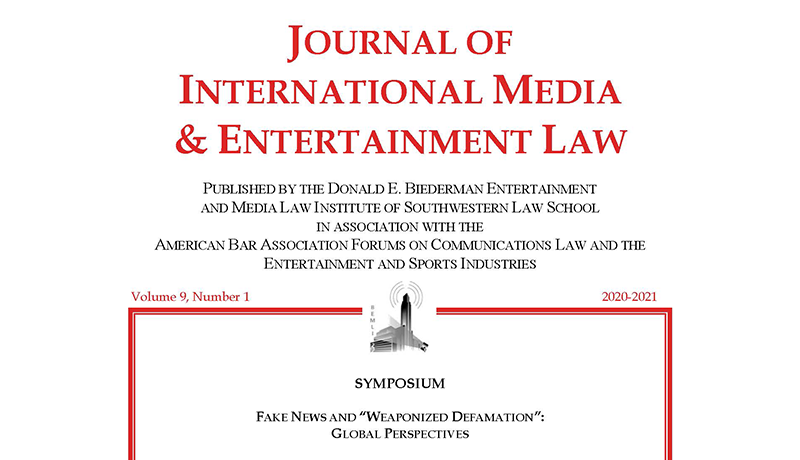SWLAW Blog | Entertainment & Media Law

December 17, 2020
Journal of International Media & Entertainment Law Publishes Volume 9, Issue 1
Southwestern’s Biederman Entertainment and Media Law Institute is delighted to announce the publication of Volume 9, Issue 1 of the Journal of International Media & Entertainment Law (JIMEL). JIMEL is the scholarly journal of the Biederman Institute, published in association with the American Bar Association’s Forum on Communications Law and the ABA’s Forum on the Entertainment and Sports Industries.
This issue is the last of three entirely devoted to articles first presented as papers at Southwestern's 2018 symposium, Fake News and “Weaponized Defamation”: Global Perspectives.

"The scholarship in this collection exemplifies the breadth and the depth of the thinking shared at that remarkable symposium," said Professor Michael Epstein, the Journal's Supervising Editor. The current issue can be accessed here.
The first article, “RICO as a Case-study in Weaponizing Defamation and the International Response to Corporate Censorship,” by Charlie Holt and Daniel Simons, laments how corporate use of the U.S.’s Racketeer Influence and Corrupt Organizations Act adds to the corrosive impact of strategic lawsuits against public participation (SLAPPs) on free speech. Holt and Simons, legal counsel to Greenpeace International, navigate the direct and immediate implications of international human rights law on business interests seeking to use SLAPP actions as a means for private censorship.
In “The Defamation of Foreign State Leaders in Times of Globalized Media and Growing Nationalism,” Alexander Heinze uses the example of the Böhmermann affair in Germany to argue against the abolishment of laws that criminalize defamation of heads of state. The author, an Assistant Professor at the University of Göttingen, posits that states which criminalize attacks on foreign government officials should also permit actions for defamation, subject to constitutional speech protections.
“Defamation Law in Russia in the context of the Council of Europe (CoE) Standards on Media Freedom,” is by Elena Sherstoboeva, an Assistant Professor at the School of Creative Media and the School of Law at the University of Hong Kong. Informed by the CoE standards, Professor Sherstoboeva compares the ways in which defamation is conceived by two of Russia’s highest courts, the Constitutional and Supreme Courts, and reviews how defamation cases are adjudicated in Russian courts of initial jurisdiction.
Wannes Vandenbussche, in “Rethinking Non-Pecuniary Remedies for Defamation: The Case for Court-Ordered Apologies,” uses a comparative law analysis to argue that apologies are an overlooked remedy in Western legal tradition that merit reconsideration in jurisdictions that have abandoned it. Dr. Vandenbussche is a research affiliate at the Institute for the Law of Obligations at KU Leuven in Belgium and a recent Fulbright Fellow at Yale Law School.
Professor Epstein also expressed his gratitude to out-going student editors Lauren Landau and Grace Khanlian, who supervised JIMEL’s student staff through much of the last year under less-than-ideal circumstances.
As the world begins to emerge from the Covid-19 pandemic, JIMEL is looking forward to publishing scholarship that engages the impact of this global calamity on entertainment and media law and practice.

Find the latest issue of Southwestern's Journal of International Media and Entertainment Law posted on our website on the JIMEL page.
The Journal of International Media & Entertainment Law is published by the Donald E. Biederman Entertainment and Media Law Institute of Southwestern Law School, in association with the American Bar Association Forums on Communications Law and the Entertainment and Sports Industries.